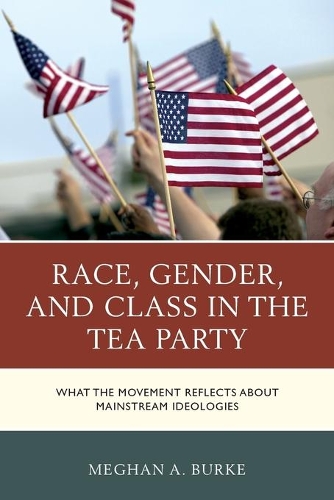
Race, Gender, and Class in the Tea Party: What the Movement Reflects about Mainstream Ideologies
(Paperback)
Available Formats
Publishing Details
Race, Gender, and Class in the Tea Party: What the Movement Reflects about Mainstream Ideologies
By (Author) Meghan A. Burke
Bloomsbury Publishing PLC
Lexington Books
24th May 2016
United States
Classifications
Professional and Scholarly
Non Fiction
Social groups, communities and identities
320.520973
Winner of Midwest Sociological Society (MSS) Early Career Scholarship Award (Author Award).
Physical Properties
Paperback
138
Width 152mm, Height 229mm, Spine 10mm
204g
Description
It has been all too tempting to characterize the Tea Party as an irrational, racist, astro-turf movement composed of members who are working to subvert their own economic interests. Race, Gender, and Class in the Tea Party reveals a much messier and much more fascinating analysis of this movement. Drawing upon in-depth interviews with organizers and fieldwork at conservative campaign trainings and conventions, its rich ethnographic data explores how the active folks in this movement, specifically organizers in one Midwestern state, understand their world, and how they act on that basis to change it. As this book will reveal, most Tea Party organizers do depend on deeply flawed understandings of race and classeither believing wholeheartedly in myths, or confining their analyses to the narrow limits of the conservative media system. Yet, Tea Party racism is simply American racism. Race, Gender, and Class in the Tea Party reveals the complexities and contradictions inherent in this movement, where organizers attempt to reconcile their personal experiences with their conservative politics. In the end, these dynamics reveal as much about us as it does about the Tea Party. It is certain to challenge all of our politics, and especially our scholarly thinking, about the movement, and offers a path toward real conversations about our collective future in the United States.
Reviews
Drawing on 25 interviews with Tea Party organizers in Illinois, Burke makes a plea for seeing this social movement as a rational response to economic distress shared with those on the Left disturbed by deindustrialization and a disappearing middle class. This brief book offers many extensive direct quotes from Burkes respondents, allowing readers to evaluate her claims about rationality and potential cross-party alliances. . . .Discourses that essentialize women as mothers and as 'giving' to the cause are interpreted as 'empowering' women politically, and anger at American 'decay' and 'elites' is given a positive spin as a form of class consciousness. Useful for both the data and Burke's provocative interpretations. Summing Up: Recommended. All academic levels/libraries. * CHOICE *
Meghan Burkes distinctive contribution to literature on the Tea Party offers original insight into the complex political and ideological terrain of race, gender, and class that informs Tea Party logic and shapes their trepidations about the future of the American democratic project. Her unique vision will certainly pique the interest of researchers across social science disciplines, particularly those interested in interrogating how the construction of white racial privilege, along lines of race, gender, and class, influences social movement activism within the Tea Party and what that means for the future of American politics. * Journal of Women, Politics, & Policy *
Race, Gender, and Class in the Tea Party moves beyond simplistic stereotypes to capture the complex ideological beliefs of Tea Party organizers. Author Meghan Burke convincingly illustrates how Tea Party understandings are not on the fringe, but are clearly connected to mainstream beliefs about race, gender, and class. This book makes an important contribution to our understanding of this influential group. -- Ashley "Woody" Doane, University of Hartford
An important and fresh look at the Tea Party. Meghan Burke masterfully portrays the complexities of a movement in which democratic impulses and womens empowerment coexist with support for continued inequalities of race and social class. Essential reading for all students of modern American politics. -- Kathleen M. Blee, University of Pittsburgh; author of Inside Organized Racism: Women in the Hate Movement
Author Bio
Meghan A. Burke is assistant professor of sociology at Illinois Wesleyan University.
